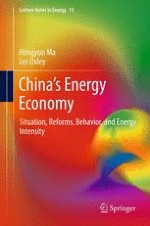2012 | OriginalPaper | Buchkapitel
8. Technological Change and the Decomposition of Energy Intensity
verfasst von : Hengyun Ma, Les Oxley
Erschienen in: China’s Energy Economy
Verlag: Springer Berlin Heidelberg
Aktivieren Sie unsere intelligente Suche, um passende Fachinhalte oder Patente zu finden.
Wählen Sie Textabschnitte aus um mit Künstlicher Intelligenz passenden Patente zu finden. powered by
Markieren Sie Textabschnitte, um KI-gestützt weitere passende Inhalte zu finden. powered by
